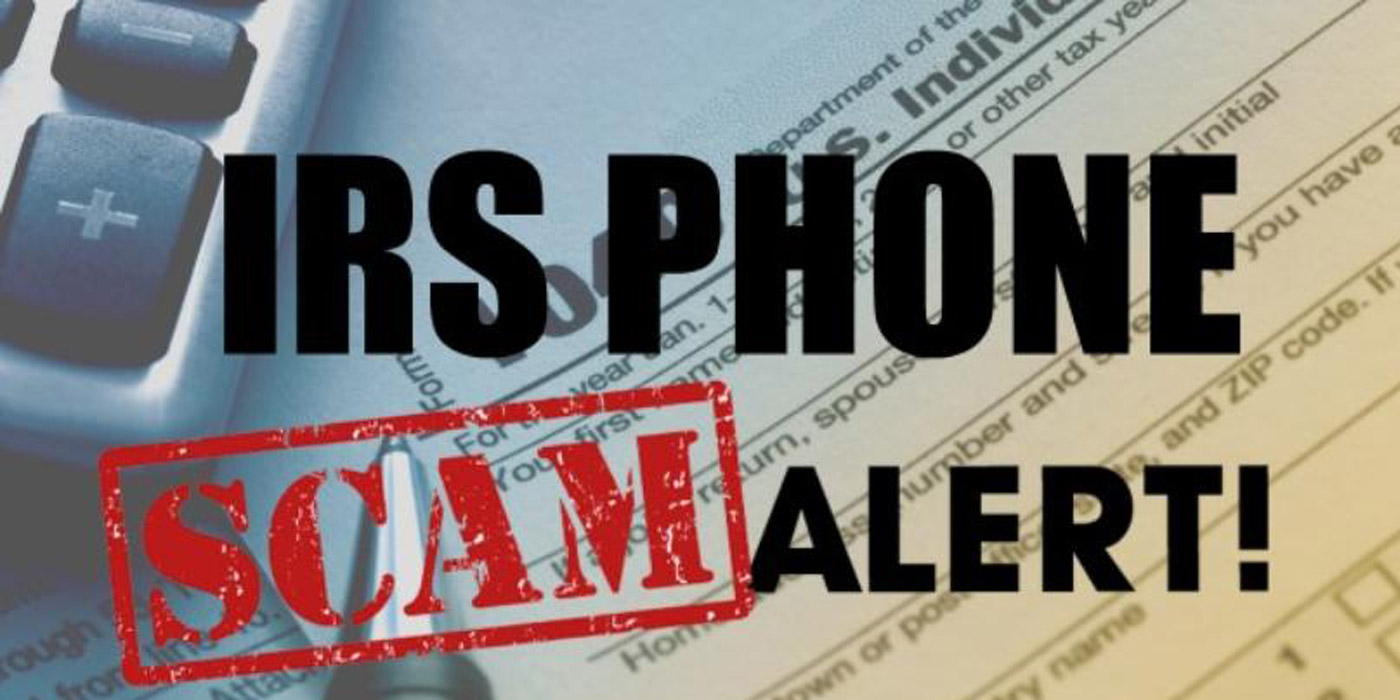Here's a list of recent IRS scams, 10 ways to spot impersonators and scammers, and how you can report them.
The latest IRS scams

Have any of these happened to you?
1. 'You need to pay a small fee to get your stimulus check'
This is a growing scam related to the government's ongoing response to the coronavirus, the Federal Trade Commission warns. Many Americans will qualify for a stimulus check, but the government (including the IRS) does not require anyone to pay anything to receive the money.
2. 'We're calling from the FDIC and we need your bank information'
The Federal Depository Insurance Corporation insures bank deposits so that consumers won't lose all of their money if a bank fails. But it does not send unsolicited correspondence asking for money, sensitive personal information, bank account information, credit and debit card numbers, Social Security numbers or passwords. Scammers claiming to be from the FDIC are hunting for information they can use to commit fraud or sell identities.
3. 'We're calling to tell you your identity was stolen; you need to buy some gift cards to fix it'
In this trick, a criminal calls the victim and poses as an IRS agent. The criminal claims the victim's identity has been stolen and that it was used to open fake bank accounts. The caller then tells the taxpayer to go buy certain gift cards; later, the crook gets back in touch and asks for the gift card access numbers.
4. 'We'll cancel your Social Security number'
In this IRS scam, the criminal contacts the victim and claims that he or she can suspend or cancel the victim’s Social Security number.
"If taxpayers receive a call threatening to suspend their SSN for an unpaid tax bill, they should just hang up," the IRS says.
5. 'This is the Bureau of Tax Enforcement, and we're putting a lien or levy on your assets'
There is no Bureau of Tax Enforcement. Victims often receive a letter from the fake agency claiming that they have a tax lien or tax levy and that they had better pay the “Bureau of Tax Enforcement” or else.
6. 'If you don’t call us back, you’ll be arrested'
Criminals can make a caller ID phone number look like it's coming from anywhere — including from the IRS, the local police or some other intimidating source. But the IRS doesn’t leave prerecorded voicemails, especially ones that claim to be urgent or are threatening. Also, the IRS can’t revoke your driver’s license, business licenses or immigration status.
7. 'Use this Form W-8BEN to give us personal data'
Although the Form W-8BEN, which is called a “Certificate of Foreign Status of Beneficial Owner for United States Tax Withholding,” is a legitimate IRS form, criminals have been modifying the form to ask for personal information such as mother’s maiden name, passport numbers and PIN numbers. (The real form is here.)
8. 'Click here to see some details about your tax refund'
These emails are intended to trick the reader into clicking on links that lead to a fake IRS-like website and expose the user to malware. The IRS never emails taxpayers about the status of their tax refunds. (We've collected in one place the links to track the status of your tax refund directly with the IRS or your state's tax authority.)
9. 'We’re from the Taxpayer Advocate Service and we need some information'
The Taxpayer Advocate Service is a legitimate organization within the IRS that helps people get assistance with IRS problems. But it doesn’t call taxpayers for no reason. Criminals are making phone calls look like they’re coming from the TAS office in Houston or Brooklyn, according to the IRS, and when taxpayers return the calls — which often tell victims they’re entitled to a large tax refund — the criminals ask for personal information such as a Social Security number.
10. 'Click on this to see your tax transcript'
In this scam, fraudsters send an email with an attachment they claim is the taxpayer’s tax transcript. (A tax transcript is a summary of a person’s tax return.) Although tax transcripts are a real thing that the IRS provides, the IRS does not email tax transcripts. You can request one directly from the IRS, which it will then mail to you.
11. 'Take this FBI survey'
This is a ransomware scheme in which criminals email messages that appear to be from the IRS or FBI. When readers click on a link to a survey that the message claims is required, the link downloads ransomware that prevents users from accessing data on their devices unless they pay off the fraudsters.
12. 'You owe the Federal Student Tax'
There is no federal student tax.
13. 'We don't need to sign your tax return even though we prepared it'
Anyone you pay to prepare your tax return must have a valid Preparer Tax Identification Number and must sign your tax return. Reluctance to sign your return is a red flag that the person is a "ghost preparer" who just wants to charge you a fee and split.
How to spot a fake stimulus check
Many Americans who qualified for a stimulus check will receive their money via direct deposit, but some will get the money via a paper check. Here are some of the indicators banks and credit unions are using to spot fake checks.
-
Check the Treasury seal. It should appear to the right of the Statue of Liberty and say "Bureau of the Fiscal Service."
-
Look for the watermark and the fine print. You should be able to see "U.S. TREASURY" on both sides of the check when you hold it up to a light. Also, there should be microprinting on the back of the check with the words "USAUSAUSA."
-
Try a UV light. There's a pattern on the check that's only visible with a UV light. It might say "FMS" or "FISCALSERVICE."
-
See if the ink runs. The black ink on the seal to the right of the Statue of Liberty should "run" and turn red when moisture is applied. Do not douse your check in water.
10 ways to spot IRS scams and impersonators
It is true that in rare circumstances the IRS will call or come to a home or business. According to the agency, that might happen if you have an overdue tax bill, haven’t filed a tax return, haven’t paid payroll taxes on your employees, or are undergoing an audit or criminal investigation.
But even then, taxpayers generally first receive several letters or notices from the IRS in the mail, and taxpayers will only be asked to pay the U.S. Treasury. Which is why the items below are major red flags that IRS scams are lurking.
-
They’re calling you first. The IRS contacts taxpayers by mail first; it doesn’t initiate contact via a random phone call.
-
They’re leaving a prerecorded voice mail. The IRS doesn’t leave prerecorded, urgent or threatening voicemails.
-
They’re emailing you. The IRS doesn't initiate contact with taxpayers by email to request personal or financial information. Do not reply to the message, open any attachments or click on any links. And note that the IRS’s website is IRS.gov — not IRS.com, IRS.net, IRS.org or some other bit after the period.
-
They’re texting you. The IRS doesn't initiate contact with taxpayers by text message to request personal or financial information.
-
They’re contacting you via social media. The IRS doesn't initiate contact with taxpayers on social media channels to request personal or financial information.
-
The form they’re sending or referencing doesn’t appear on the IRS website. You can look up the names of IRS notices and letters on the IRS website. If the type of notice you received doesn’t show up on the list, it’s probably not legit.
-
They don’t know what an HSPD-12 card is. Real IRS agents have two forms of identification: a pocket commission and an HSPD-12 card. You have the right to see these credentials, and you can verify information on the HSPD-12 card by calling the IRS (go here for a list of IRS customer service phone numbers).
-
They’re asking for a credit card or debit card number over the phone. The IRS doesn’t do that.
-
They want you to pay only with gift cards, iTunes cards or prepaid debit cards. The IRS doesn’t use these methods for tax payments. The IRS mails paper bills to taxpayers who owe taxes, and payment should only ever be made out to the U.S. Treasury — not a collections agency or other entity. (See some real ways to pay the IRS.)
-
They’re saying you’ll be arrested, deported, have your driver’s license revoked, etc. The IRS can’t revoke your driver’s license, business licenses or immigration status. In addition, the IRS and the Taxpayer Bill of Rights give you the opportunity to question or appeal what the IRS says you owe.
But what if I really do owe the IRS money?
If you think you might owe money to the IRS, you can check that directly with the IRS (and for free) by visiting https://www.irs.gov/payments/view-your-tax-account. If you do owe back taxes and want to make a payment, you can send money directly the IRS or sign up for an installment plan to pay the IRS over time. All of those things you can do yourself directly with the IRS.
Fight back: How to report IRS scams
-
Tell the Treasury Inspector General for Tax Administration (TIGTA). You can report IRS scams online at or by calling TIGTA at 1-800-366-4484.
-
Forward email messages that claim to be from the IRS to
This email address is being protected from spambots. You need JavaScript enabled to view it. . Do not open the attachments or click on any links in those emails. -
Tell the Federal Trade Commission via the FTC Complaint Assistant on FTC.gov. Add "IRS Telephone Scam" in the notes.
-
Report Social Security Administration phone impostor scams using the form on the Social Security Administration's website.
-
If the IRS scams appear to be impersonating a state tax authority rather than the IRS, contact your state Attorney General’s office.



